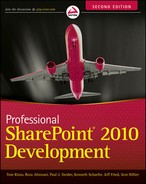CONTENTS
CHAPTER 1: INTRODUCTION TO SHAREPOINT 2010
What's New in the SharePoint Platform and Tools
Business Connectivity Services
Web 2.0 Protocols and New Standards
Sandbox Solutions and Resource Governors
InfoPath (Forms, List Forms, Mobile Forms)
What's New in Collaboration/Social Computing
Outlook Social Newsfeeds and Expertise
New Core Search Query Capabilities
Enhanced People Search: Phonetics
Enhanced People Search: Address Book–Style Lookups
Enhanced People Search Results
New Search Connector Framework
What's New in Enterprise Content Management
What's New in Groove (SharePoint Workspace)
CHAPTER 2: DEVELOPER TOOLS FOR SHAREPOINT 2010
Understanding SharePoint Designer 2010
Understanding Visual Studio 2010 Tools
Setting Up Your Development Environment
Troubleshooting with Debugging and Testing
Debugging Using the Developer Dashboard
Debugging Using SharePoint Logs
Unit, Capacity, and Load Testing
Other Useful Tools for Debugging and Testing
Deploying and Maintaining Your Code
ALM with VS 2010 and SharePoint
New in VS 2010 Service Pack 1: IntelliTrace and Unit Testing
Moving from Test to Production
CHAPTER 3: IT PRO ENHANCEMENTS FOR THE DEVELOPER
Streaming Media and Bit Rate Throttling
High-Availability Improvements
Database Mirroring and Clustering
Security Improvements in SharePoint 2010
CHAPTER 4: SHAREPOINT PLATFORM
Status Bar and Notification Area
List, View, and Event Enhancements
Types of Solutions You Can Build
Writing a SharePoint Mobile Adapter
Safe Controls and Editing the Compat.Browser File
Creating a Windows Phone 7 Application
CHAPTER 5: COLLABORATION AND SOCIAL COMPUTING
User Profile Service Application
Blogs and Wiki Site Definitions
Search Options with SharePoint 2010
FAST Search Server 2010 for SharePoint
Choosing the Right Search Product
Search Architecture and Topologies
SharePoint Search Key Components
FAST Architecture and Topology
How Architecture Meets Applications
Developing with Enterprise Search
Customizing the Search User Experience
Example: New Core Results Web Part
Example: Adding Sorting to Your New Web Part
Search Connectors and Searching LOB Systems
Summary – Customizing Connectivity
Customization Examples Using Federation
Further Considerations in Federation
Examples Using Query Customization
End-User-Visible Functionality
Metadata, Linguistics, and Search
Advanced Content Processing with FAST
Extending Search Using the Administrative OM
Combining Search with Other Workloads
Combining Search with Other Features
Search Capabilities in Office 365
Combining On-premises and In-cloud Content with Search
SharePoint 2010 Records Management Overview
Declaring and Undeclaring a Record
Creating Workflows that Use RM
CHAPTER 8: WEB CONTENT MANAGEMENT
The Content Lifecycle in Web Content Management
Separation of Content and Development
The Important Role of Information Architecture
Foundations of Web Content Management
Activating the Publishing Features
Browser-Based Site Column Development
Feature-Based Site Column Development
Object Model-Based Site Column Development
Understanding Content Type IDs
Browser-Based Content Type Development
Feature-Based Content Type Development
Object Model-Based Content Type Development
Client Object Model-Based Content Type Development
Creating a Page Layout with SharePoint Designer
Create a Page Layout with Visual Studio
Creating a Master Page with SharePoint Designer
Creating a Master Page with Visual Studio
Setting the Master Page in Code
Customizing Navigation with Site Settings
Implementing Navigation in the Master Page
Customizing Navigation Using the Object Model
Customizing Navigation with Web Parts
Using the Content by Query Web Part
Customizing Content by Query Web Part in XML
Using Custom XSL to Modify the Presentation of Content
Redeploying the Content by Query Web Part Using Visual Studio
Setting Up Document Conversion
Introducing the Training Management Application
Customizing SharePoint List Forms
Customizing SharePoint List Forms
Adding Intelligence Using Rules and Views
Distributing the Trainings List
Designing InfoPath Form Templates
Querying SharePoint Lists in Forms
Publishing to a Form Library vs. Publishing to a Content Type
Building Web Parts Using InfoPath
Using InfoPath to Create Connected Web Parts
Getting Data from Other Web Parts
CHAPTER 10: ECM: DOCUMENT MANAGEMENT
A New Enterprise Content Mindset
Getting the Most Out of the Document Center
Visual Studio and the Document Center
Managing the Content Organizer
Using Document Libraries in the Document Center
Metadata Navigation and Filtering
Visual Studio and Document Libraries
Managed Metadata Service Application
Create a Custom Document ID Provider
CHAPTER 11: INTRODUCING BUSINESS CONNECTIVITY SERVICES
Introducing Business Connectivity Services
Understanding BCS Architecture
Understanding Business Data Connectivity
Understanding the Secure Store Service
Understanding Package Deployment
Working with BDC Metadata Models
Working with External Datasources
Connecting with the SQL Server Connector
Connecting with the WCF Service Connector
Implementing Method Stereotypes
Creating Methods for Databases
Creating Methods for Web Services
CHAPTER 12: ADVANCED BUSINESS CONNECTIVITY SERVICES
Creating .NET Assembly Connectors
Understanding the Project Tooling
Walking Through the Development Process
Working with the BDC Server Runtime Object Model
Connecting to the Metadata Catalog
Creating the Training Content Type
Workflow Development Lifecycle
Customizing the Workflow in SharePoint Designer
Creating Custom Actions with Visual Studio 2010
Importing to Visual Studio 2010
Building Workflows with Visual Studio 2010
CHAPTER 14: BUSINESS INTELLIGENCE
Challenges with Traditional Business Intelligence
Integration with SharePoint: The History
Highlights of Business Intelligence in SharePoint Server 2010
Important BI Terms and Concepts
Using the AdventureWorks Sample Databases
The Starting Point: Business Intelligence Center
PerformancePoint Services Architecture
Introducing Dashboard Designer
One-Click Publishing to SharePoint
BIDS 2008 R2 or Report Builder 3.0?
Building and Deploying Reports
BPOS: SharePoint Online Overview
Differences Between SharePoint On-Premises and Online
What's in SharePoint Online in Office 365
Developer Tools for Windows Azure
SharePoint and Azure Integration Scenarios
Integrating SQL Azure with SharePoint On-Premises
Integrating SQL Azure and SharePoint Online
Connecting to On-Premises from SharePoint Online
Writing SharePoint Online Applications
Identity and Authentication in Office 365
Calling the Client Object Model
Writing a Sandbox Solution in Office 365
Connecting Outside of Office 365 with Silverlight
